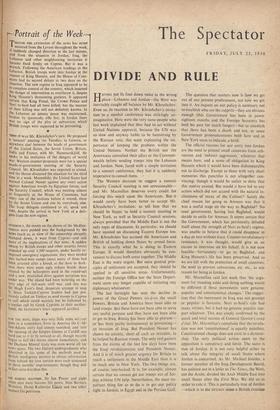—Portrait of the Week-4
THOUGH THE ATTENTION of the news has never
wavered from the Levant throughout the week, it suddenly changed direction at the last minute, and from the situation in Jordan, Iraq, the Lebanon and other neighbouring territories it became fixed firmly on Cyprus. But it was a wrench. Following the American landings in the Lebanon, British troops went into "Jordan at the request of King Hussein, and the House of Com- mons had its second debate in two days on the situation. The new regime in Iraq appeared to be in complete control of the country, which lessened the danger of intervention to overthrow it, despite King Hussein's threatening gestures. It appeared certain that King Feisal, the Crown Prince and Nuri es-Said had all been killed; but the manner el their killing was still not definitely known. In the Lebanon an uneasy peace was maintained, broken by spasmodic rifle fire; in Jordan there Was no sign of the plot or subversiorrwhich British troops were supposed to be preventing.
*
THEN IT was Mr. Khrushchev's turn. He proposed a 'Summit' meeting 'on Tuesday, in Geneva, or anywhere else' between the heads of government of the United States, the Soviet Union, Britain, India and France, with Mr. Hammarskjold. He spoke in his invitation of the dangers of world War. Western counter-proposals were for a special beads-of-government meeting of the Security Council. Mr. Khrushchev was expected to attend, and the House discussed the situation for the third time in a week. Meanwhile, the United States had warned Colonel Nasser against any overt action against American troop by Egyptian forces, and the Security Council, which was meeting almost as frequently as the House of Commons, had every one of the motions before it vetoed, three by the Soviet Union and one by everybody else. The Iraqi delegate continued to sit, speak and vote, despite the arrival in New York of a dele- gate from the new regime.
*
SUDDENLY, the events on the shores of the Mediter- ranean were pushed into the background by the news (such as, in view of the censorship abruptly clamped down, it was) from Cyprus—and still more of the implications of that news. A sudden swoop by British troops and other security forces rounded up over 1,500'suspects, under hastily re- imposed emergency regulations; they were herded into barbed-wire camps (since many of them had been arrested 'after a knock at the door in dark- ness there were some ugly echoes beside those _ created by the helicopters used in the round-up) and a new, intensified drive against terrorism was under way. The island had been teetering on the very edge ,of full-scale civil war, and this was Sir Hugh Foot's final, desperate attempt to stop it. Since Turkish-Cypriot leaders had just pre- viously called on Turkey to send troops to Cyprus (a call which could scarcely but be followed by a similar call by Greek. Cypriots to their mother- land), the Governor's fears appeared justified.
POR THIS REST, there was very little news wit'iout guns in it somewhere. Even in America the ( ,Id- line-Adams story had almost vanished, and iicre the Opening of the Empire Games at Cardiff was hard put to it to be noticed at all, though records began to fall like leaves almost immediately, and the Durham Miners' Gala was even worse of for news space. The two Oxford undergraduates who ddscribed in isi's some of the methods used by British intelligence services to obtain information from behind the iron curtain were each sentenced to three months' imprisonment, though they will in fact serve less than this.
*
slit ROBERT BOOTHBY, Sir Ian Fraser and eight "tiler men have become life peers; Miss Barbara Wootton, Dame Katherine Elliott and two other Women life peeresses.


































 Previous page
Previous page